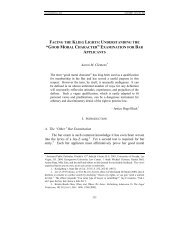The Science and Statistics Behind Spanking Suggests that
The Science and Statistics Behind Spanking Suggests that
The Science and Statistics Behind Spanking Suggests that
Create successful ePaper yourself
Turn your PDF publications into a flip-book with our unique Google optimized e-Paper software.
11-FULLER_FINAL_AFTERPROOF.DOC 2/17/2009 8:50 AM<br />
2009] THE SCIENCE AND STATISTICS BEHIND SPANKING 279<br />
<strong>that</strong> if someone feels spanking is wrong, he will tend to perform or<br />
interpret research to support <strong>that</strong> feeling; <strong>and</strong> likewise with someone<br />
who feels spanking is right. 179<br />
Accordingly, many spanking opponents begin their research with a<br />
conclusion, not a hypothesis. 180 For instance, Dr. Murray Straus admits<br />
<strong>that</strong> his goal is to prove <strong>that</strong> spanking, “by itself, has harmful<br />
psychological side effects for children <strong>and</strong> hurts society as a whole.” 181<br />
Moreover, a review of the spanking research suggests <strong>that</strong> eighty-three<br />
percent of the corporal punishment articles in clinical <strong>and</strong> psychosocial<br />
journals are “merely opinion-driven editorials, reviews or commentaries,<br />
devoid of new empirical findings.” 182<br />
When scientists begin their research having already formed a<br />
conclusion, it’s more likely <strong>that</strong> their bias “will be confirmed, not<br />
amended or rejected by the ensuing evidence.” 183 Indeed, spanking<br />
opponents have been known to design studies <strong>that</strong> peculiarly suit their<br />
bias; they have been known to address problems with their research only<br />
<strong>The</strong> fallacy . . . can create a personal holocaust <strong>that</strong> permanently destroys the client’s life.<br />
Finding the best reasons for symptoms protects those symptoms from changing. It’s like building a<br />
wall around the pathology so <strong>that</strong> nothing can reach it. An addict who has an excuse to snort<br />
cocaine will keep on using . . . a married partner who keeps blaming his or her spouse will end up<br />
with a broken marriage. Finding the good reason locks problems in place <strong>and</strong> keeps people from<br />
solving them.”) (emphasis in original).<br />
179. See, e.g., Erica Goode, Findings Give Some Support to Advocates of <strong>Spanking</strong>, N.Y.<br />
TIMES, Aug. 25, 2001 (quoting Dr. Straus as saying, “as in many scientific debates, each side tended<br />
to marshal the evidence <strong>that</strong> supported its view.”).<br />
180. See, e.g., STRAUS, supra note 33, at xx (“the assumption <strong>that</strong> guided this research is <strong>that</strong><br />
corporal punishment, by itself, has harmful psychological side effects for children <strong>and</strong> hurts the<br />
society as a whole”); Trumbull, supra note 123 (describing a review <strong>that</strong> found 83 percent of the<br />
132 identified articles published in clinical <strong>and</strong> psychosocial journals were merely opinion-driven<br />
editorials, reviews or commentaries, devoid of new empirical findings. “[M]ost of the empirical<br />
studies were methodologically flawed by grouping the impact of abuse with spanking. <strong>The</strong> best<br />
studies demonstrated beneficial, not detrimental, effects of spanking in certain situations.”) (citing<br />
Dr. John S. Lyons, Rachel L. Anderson & Dr. David B. Larson, <strong>The</strong> Use <strong>and</strong> Effects of Physical<br />
Punishment in the Home: A Systematic Review, Presentation to the Sec. on Bio-Ethics of the Am.<br />
Acad. of Pediatrics (Nov. 2, 1993)).<br />
181. Id. (saying the problems likely to beset a spanked child “range from attacks on siblings to<br />
juvenile delinquency, wife beating, depression, distorted sexual behavior, to lower occupational<br />
success <strong>and</strong> income”).<br />
182. See, e.g., Trumbull, supra note 180 <strong>and</strong> accompanying text; Trumbull, supra note 123.<br />
183. Baumrind, Causally Relevant Research, supra note 21, at 14 (“When a scientist begins<br />
his or her research with an already formed conclusion, as Straus does, it is likely <strong>that</strong> the initial bias<br />
will be confirmed, not amended or rejected by the ensuing evidence.”).

















